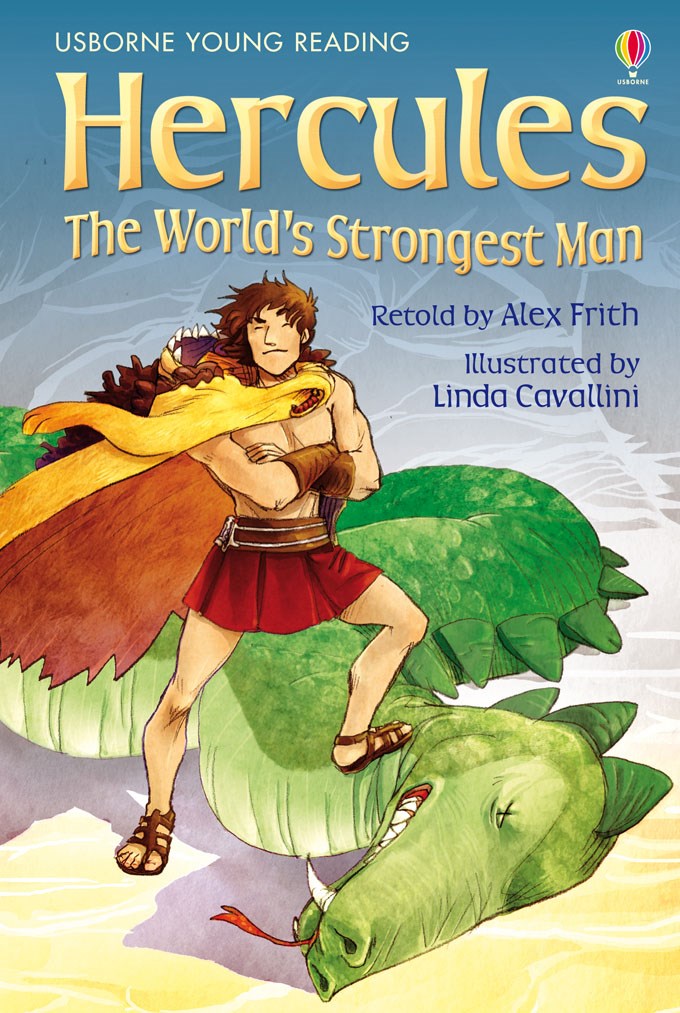Title of the work
Country of the First Edition
Country/countries of popularity
Original Language
First Edition Date
First Edition Details
Alex Frith and Linda Cavallini. Hercules: The World's Strongest Man. Usborne Publishing Ltd, 2014, 64 pp.
ISBN
Genre
Myths
Picture books
Target Audience
Children
Cover

Cover reproduced from Hercules: the World's Strongest Man, by permission of Usborne Publishing Ltd., 83-85 Saffron Hill, London EC1N 8RT, UK. usborne.fr (accessed: July 31, 2018).
Copyright © 2011 Usborne Publishing Ltd’.
Author of the Entry:
Ayelet Peer, Bar-Ilan University, ayelet.peer@gmail.com
Peer-reviewer of the Entry:
Lisa Maurice, Bar-Ilan University, mauril68@gmail.com
Elżbieta Olechowska, University of Warsaw, elzbieta.olechowska@gmail.com

Linda Cavallini (Illustrator)
Linda is a freelance illustrator based in Florence, Italy. She studied at art high school and fine arts academy. She trained at the Academy of Fine Art in Firenze. She also followed the dance company "ballet of Tuscany" as a stage assistant.
Sources:
Official website (accessed: July 4, 2018).
Profile at the tatailab.com (accessed: July 4, 2018).
Bio prepared by Ayelet Peer, Bar-Ilan University, ayelet.peer@gmail.com and Sonya Nevin, University of Roehampton, sonya.nevin@roehampton.ac.uk

Alex Frith (Author)
Alex Frith is a British children's author and editor. Alex has been writing children books for years on various subjects. Among his books: submarines, big book of dinosaurs, human body picture book and more. He has worked for Usborne publishing since 2005, contributing to the Young Reading series with myth-based titles including Hercules: The world's strongest man (Usborne Young Reading, Series 2, 2011) and Stories of Thor (Usborne Young Reading, Series 2, 2016). Alex Frith has authored other myth-based titles, such as Illustrated Norse Myths (Usborne, 2013), and many non-fiction (particularly science) titles, amongst which are: What's Happening to Me? (Usborne, 2007), See Inside Science (Usborne, 2007), and Big Book of Big Dinosaurs (Usborne, 2010).
Bio prepared by Sonya Nevin, University of Roehampton, sonya.nevin@roehampton.ac.uk and Ayelet Peer, Bar-Ilan University, ayelet.peer@gmail.com
Summary
This book is a retelling of the story of Hercules aimed to encourage reading; the story was developed at the University of Roehampton with the consultation of Alison Kelly, Senior Lecturer. The story follows Hercules after he has killed his family and is performing his 12 labours until the gods forgive him. At the end, the story of how Hera tried to kill Hercules as an infant and how he joined the Argonauts is briefly summarized.
Analysis
Before the story begins, we have a short introduction telling the children that "Hercules is the perfect hero - strong, fast brave and very proud. But even he can't stand up to the anger of Hera, queen of the gods." Hercules then needs to complete the tasks to prove that he is the strongest in the world. Yet what makes Hercules a “perfect hero”? We do not know; throughout the story, Hercules exhibits courage, but also pride, and he is not presented as being too smart; so the message for children on what makes a hero might seem confused. Are bravery and strength the only signs of a hero?
The story begins with an explanation of Hercules Roman name; it is mentioned that although he was born in Greece as Heracles, "his story was spread all over the world by the Ancient Romans, who called him Hercules." (p. 2). This remark is quite misleading; Heracles was very known in the Greek world, yet the Roman pronunciation prevailed. Then we meet Hercules crying and lamenting the death of his family. It is an interesting choice for the author to begin the story with this traumatic event, given that it is aimed at young children. The murder is explained as the result of Hera's machinations; she poisoned Hercules' wine, and he became mad and thought his family were wild animals. Hera's hatred towards Hercules is explained by the fact that he was not her son but the product of Zeus' infidelity. Nothing more is added to this point, and the reader is left with the feeling of Hera as a wicked stepmother. As can be seen, the author did not avoid the unpleasant parts of the story, which are crucial to it, and chose to approach them with care. There is no graphic detailing of the murder, and we have a logical explanation that children can understand. This is not a father murdering his family but a man possessed by an evil potion.
Hercules still wishes to become a hero, and Zeus gives him the order to find Eurystheus; he announces that he will forgive Hercules' deed if he can prove his strength and determination. It would have been better if the tasks were more clearly presented as Hercules' attempts (punishment) to make amends for what he had done and not for him to be a hero. After receiving Zeus’ order, Hercules sets off to king Eurystheus and then on his tasks. An excellent reference to a classical painting is presented when Hercules delivers the boar; the illustration resembles the famous picture of the frightened Eurystheus in the jar. All the tasks are accounted for, even the not often referred to freeing of Prometheus. In the end, Hercules is forgiven by Zeus. While murdering his family was mentioned, the children are spared from reading Hercules' tragic end and the involvement of Deianeira, a decision that does not harm the story. Hercules remains a hero who showed true strength. His poisoning by Deianeira seems irrelevant to the motif of the story of being a hero.
Addenda
The review refers to the Kindle edition.
ASIN: B00K1XTVV0


